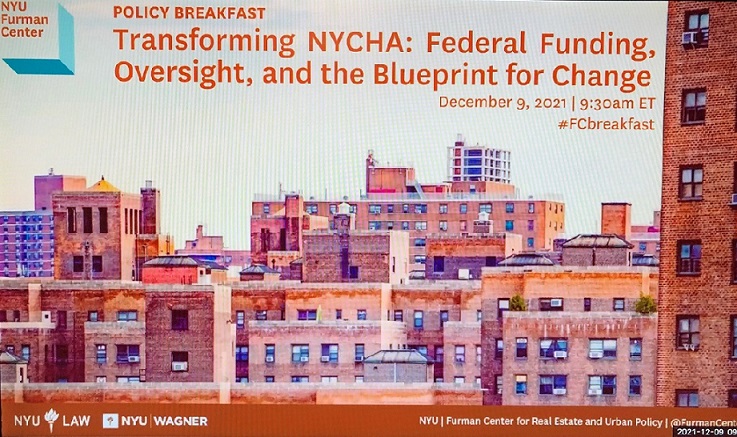Chair Russ Joins Furman Center Panel Discussion on NYCHA’s Future
The challenges and opportunities NYCHA faces in transforming itself were the focus of a virtual panel discussion recently presented by the NYU Furman Center.
Titled “Transforming NYCHA: Federal Funding, Oversight, and the Blueprint for Change,” the discussion featured panelists including NYCHA Chair & CEO Greg Russ; New York Lieutenant Governor Brian Benjamin; Daniel Sherrod, Director of Federal Monitorships for the U.S. Department of Housing and Urban Development (HUD); Damaris Reyes, Executive Director of the social services organization Good Old Lower East Side; and Walter McNeil, Resident Association President of Edenwald Houses. The panel was moderated by Katherine O’Regan, Faculty Director of the Furman Center, which works to advance research and debate on housing, neighborhoods, and urban policy.
Touching on the 2019 HUD Agreement that appointed a federal monitor and ensures that NYCHA complies with its obligations under federal law, Chair Russ spoke about some of the Authority’s challenges as it looks to the future:
“I think the struggle, the tension that actually affects all of us, is that we are rapidly losing the ability to repair. We’re going to have to replace and renew, and if we don’t do replacement and renewal, the repairs are just going to be getting harder and harder to do, even if we could add additional staff. The HUD Agreement required us to do a complete reorganization; we’ve done that in the boroughs with the property management, and it’s just starting to take hold. We’re doing it with skilled trades next, and we’re doing property management-focused initiatives.
“There’s a ton of changes yet to come on how we do capital repairs, how we’re going to do the skilled trades work – and these are all in the works in the pipeline. We’re at a place where we have to put money at scale into the entire property; we have to do comprehensive modernization.
“We’re starting our first comprehensive modernization this year and next year, and this is for the entire building. One of our problems is we’ve gotten capital for pieces of the building, but not the whole building, and we have to solve for that. The capital is essential to the future of these buildings and the protection of our families.”








